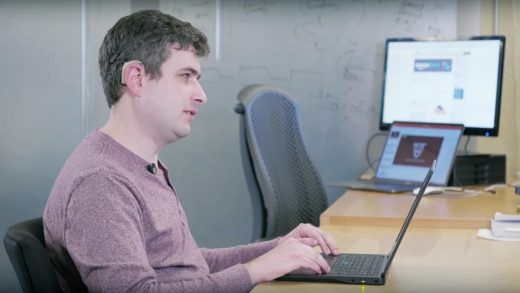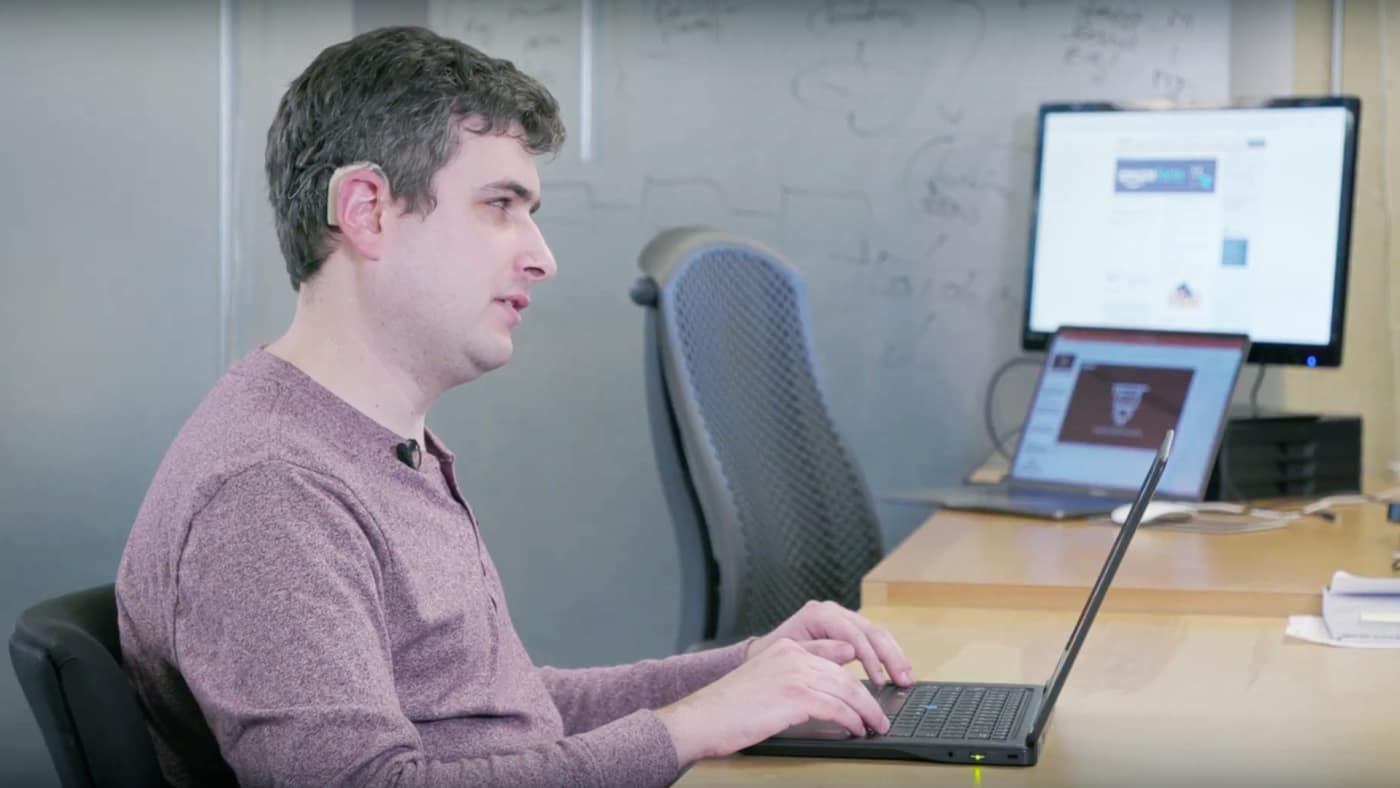What It’s Like To Be A Blind Software Engineer At Amazon
Everyone’s dream job is different. For some, it may be working with a bold leader, while want to have a hand in world-changing innovation. But Michael Forzano’s a dream job was rooted in a more the practical concern: making shopping more accessible.
Forzano isn’t some shopaholic racking up credit-card debt from his couch, though. He’s a 26-year-old engineer who’s been blind since birth due to a genetic condition called Norrie disease. When it comes to buying basic necessities, Amazon has been a huge help. “Instead of having someone walk me around a store and help me find what I’m searching for, I can just order it from Amazon,” Forzano explains. “I have access to all of the information about the product. It enables me to be much more independent.”
Forzano has always been comfortable around computers, playing audio-based games as a kid and later teaching himself to code in high school. While earning an engineering degree at Binghamton University, he interned for the summer at Amazon in Seattle. It turned into a job offer after Forzano graduated, in 2013, and he’s been working with the e-commerce giant ever since.
Forzano is among a small population of fully blind people to be employed, much less as software engineers. According to disability statistics from the American Community Survey (ACS) for working-age adults reporting significant vision loss, only 42% were employed in 2015 (the most recent year with data). And of the 64,000 software developers Stack Overflow polled last year, 1% are blind. Amazon doesn’t require its employees to disclose that information, so there’s no hard data on how many of the company’s staffers are blind or visually impaired. Still, Forzano says he’s the only person on his immediate team with Norrie disease and full blindness.
At a time when most of us–software developers or not–spend hours each day staring at screens, it’s hard to imagine not using our eyes to work. In a recent email exchange with Fast Company (lightly condensed and edited for clarity), Forzano shared how he’s handled the traditional whiteboard coding challenge during his job interview and many of the other obstacles he’s confronted since as an engineer at a highly competitive tech company.
Landing The Job
At the time [I applied to work there], Amazon recruited directly from Binghamton. They posted the position on our school job-board and a friend encouraged me to apply. I thought, “Why not?” Being a shopper at Amazon, I thought it was really awesome that I could be a part of the technology that creates the experience for so many customers.
[Even so,] I thought I had no chance to work at one of the big companies like Amazon. Being blind, people may be focused on how you’re going to do the job–without even seeing the results you produce. I view blindness as just another characteristic, it’s not something that defines me. My process may be different, but I deliver results.
I walked into the room [on campus where Amazon recruiters were meeting students], and they saw that I was blind. I asked them if I could use my computer (instead of a whiteboard). They said sure and I did my interview [on a standard laptop with screen-reader software, which translates every aspect of using a computer into audio cues.] In software engineering you can see someone doing their job; there was no doubt I was writing the code. I just answered their coding questions in two 45-minute interviews. Ultimately, they must have been impressed because I got the job and have been here ever since. I’m pretty glad I took the chance now!
“Difficult But Not Impossible”
When I first started my internship [in summer 2012], I was assigned to a project I wasn’t super interested in, and there was a lot of UI development involved. It would be difficult but not impossible for a blind person to do front-end development. You’re dealing with the visual layout of the web page–colors, styles, how the elements are positioned on the page. So my manager switched me to a back-end project for the summer that didn’t require me asking my coworkers about what the user experience looked like. I didn’t even have to ask; he wanted me to be successful and enjoy my project. So instead I helped develop a service that would send out email reminders for the people who rented out textbooks. It was really exciting working on a launch for something that hadn’t been provided to customers before.
When I came back as a full-time employee, I came to work on the trade-in team. That’s a team that works on when you have an old product, you trade it in and Amazon gives you a gift card. In July 2016, I came to my current team where we build tools that enable other teams to ensure that the retail site features are accessible.
I faced a lot of the same challenges as any new hire out of college: new technology at work, transitioning to a working schedule, moving across the country, living on my own, making new friends. Any time you have a 22-year-old straight out of college, people probably have doubts [about how that new hire will perform]. As for my blindness, I can’t read their minds. It seems like people are pretty open-minded here. When I interact with people over email, they have no idea I’m blind. Let’s say I’m at a meeting with someone I’ve never met in person, my blindness has yet to come up in conversation.
Yes, I have felt that I had to work harder than people who can see, but it’s mainly pressure I put on myself. With the unemployment rate being so high (for blind individuals) and as one of few blind people who are employed, I want to work hard for the community and show them what’s possible. However, I don’t get the sense that my manager or coworkers expect more from me. [My teammates] haven’t had to [advocate for me]. At Amazon we like our “owner’s culture,” I advocate for myself when needed, and I think my work speaks for itself, just like anyone else.
Education And Exposure
There are people on the street that ask me things like, “Can your dog tell you when to cross the street?” or “Can she read the traffic lights?” In fact, it’s more of a team effort. If we can turn left to go to my favorite restaurant or right to go to work, I still have to tell her which way to go (haha).
I think education is really important for everyone–and so is exposure. Unless people have interacted with someone that is blind, they’re relying on pop culture, literature, and their friends to learn more. As we all become more exposed, open-minded, and ultimately educated about people that are different than ourselves, there will be more opportunities for all people to contribute meaningfully to our community.
One of my friends in Seattle, who is blind, uses Amazon Fresh (it’s just easier) and realized there was a bug in the Fresh app for blind users: You couldn’t select a delivery time if you were using a specific screen-reader on a smartphone. Once she told me that, I reached out to the Fresh team to make them aware of the issue and the customer impact. Then the team let me know, almost immediately, that they were working on a solution.
At that moment, I knew I was in a place where it didn’t matter who the customer was or what the struggle was, but that the customer obsession was ingrained in our DNA. That sort of egalitarian approach drives me and my team every day. The best part is, when you make things more accessible for one community, it often helps everyone, too. Being a part of making that happen for millions of customers is really exciting.
(32)



